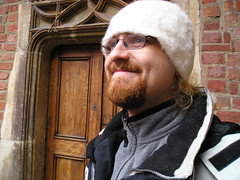This past Monday, I went to see philosopher
John Harris talk about his views on organ donation. Harris made two proposals with respect to organ donation--for one, we should have an automatic system of organ explantation. You die, we (i.e. the state)
take your organs. The second proposal was for a
regulated and restricted market in live organ sales. People should be able to sell their kidney for a price, if they'd like.
Underscoring all of this is the fact that people are regularly passing away for want of a kidney or part of a liver, something that could be remedied by either the first or the second proposal, but both would be best. I'm writing here from my impressions of Harris' views as gathered during the discussion. That shouldn't imply that I got his views right, in any way whatsoever. It is probable that I get them wrong a lot of the times. Nevertheless, the views that I attribute to Harris--which may actually be Harris' views--are plausible, and worth a look since someone could conceivably hold exactly them.
Harris thinks what counts, morally speaking, is autonomy. That's what it means, in part, to be a person--it's to be able to decide about what affects you. (After the talk, I went out for drinks and then dinner with Harris, my prof Luc Bovens, my lecturer Alex Voorhoeve, and my friend Byron Rienstra. I asked him about children, and what he thinks about the fact that we don't take their autonomy so seriously. He thinks that's a mistake. I said, 'what about a three-year-old? Surely we don't want to grant three-year-olds full autonomy, do we?' and he bit the bullet! "Have you ever been around a three-year-old? I think you would be surprised just how much autonomy we could grant them. And we should.")
Once you're dead, however, all that autonomy goes away. There is no person left whose interests/preferences/whatever attach to. Those things go away and, if they go away, then so does any moral apprehension about doing what we'd like with the dead. (Including necrophilia, although Harris admits that there may be some story to tell about why that might not be such a good idea. But, at least, he sees no such reason at the moment.) So we should be free to mine their organs.
During the course of the lecture, I asked two somewhat related questions. The first was the obvious religious objection--say we're Orthodox types who believe that, should our bodies be cut up after our death, we go to heaven all cut up. Or not at all. Harris pooh-poohs these sorts of objections with three retorts. His first response is to blithely quip that this is just irrational nonsense. And we shouldn't pander to irrational beliefs.
The second, if we're not exactly bowled over by the hand-waving dismissal, is that it is a myth that our bodies remain untouched, or whatever, after our death. Worms crawl through us, gases blow us up, about two or three months into it, we're all in pieces as a consequence of natural decomposition and decay. So it goes, he says, so what sort of objection is sanctity of the whole-ness of the body anyway? (Egyptian mummification comes to mind as an effective way of managing this whole-ness affair... but never mind).
Lastly, consider the fact that we do autopsies. No one seems to object to us doing this sort of thing, and we have very good reasons for doing them. In cases of murder, or to ascertain the precise cause of death, we measure, pry open, cut up, analyze, and so on. The outcome is the same--on the slab, our organs get little sanctified respect. This last is a good retort. We might be inclined to say that we are doing something wrong even in cases like that, but I don't think that counter-retort will do much work.
My second question dealt with the intentions of those who are living, but have passed on. In setting up an institution, I used the constitution of the United States as an example, we do so with particular purposes in mind. Do those matter after we're dead? In the U.S., much hinges on what the supposed intentions of the founding fathers were, even though none of them are around. In the same way, can we not now have future regarding interests that do some work, and might be morally important? Harris doesn't think so. Why should those sorts of interests matter, he asks? If the people whose intentions mattered are no longer people in any morally relevant sense, then what we do with their institutions is our business, not theirs. There being no one around to have those interests or intentions, and interests and intentions are not the sorts of things that fly around separate from the persons in question. With the death of the person comes the death of the interests, intentions, purposes, and so on, that they may have had.
This misses the point, I think. Consider the following: Say Bob has the following irrational belief. If his organs are mined after his death, all his plants will die. Bob is really keen about his plants, and really worries about what will happen to them after he passes on. He goes to all the trouble of tattooing this belief on his chest, should he expire in a way that will not allow him to pass on the message to the doctors or surgeons or autopsy people who may fiddle with his body after his death. Harris would say that this belief has no moral force. But suppose Bob stays up all night worrying about what will happen to him later? Suppose that, right now, Bob is disconcerted by his knowledge that organs will be taken out of him regardless of his opinion about it. Does that matter?
I asked Harris that at the bar, and he was unmoved. His response? Well, and so what? Say I stay up all night concerned that I'm not having any sex? Does that morally obligate us to do something about this worry? Surely not. But this response is not on point. In this case, Harris is suggesting that the moral obligation runs in the direction of doing something about the concern--namely, providing someone for sex, or something like that. In the case that I put to him, the point was to say that we should do nothing. And not taking out organs is hardly the same as providing something--a sexual partner. At any rate, I still think that it morally matters what your interests are, regardless of the content of those interests (or preferences). It is sufficient for something to count for you to have an interest or preference with respect to it. This includes everything. The extent to which it counts, however, will depend on the content. If I have an interest in beating my wife, it won't be the case that that interest counts for exactly nothing, but it will be the case that it will be
overridden by other interests that my wife, or 'society,' or whatever, might have.
In the case of Bob, his interests will count, but our interests in getting his organs may override the interest he has in having his plants survive. After all, people are dying on waiting lists for organs that people like Bob can provide. Since Harris' point is to say that Bob's interests count for exactly nothing, then consider this scenario: Bob is dead. He's on a slab, and right next to him is Betty. She, too, is dead. Jenny, meanwhile, is in need of a kidney, and it turns out that both Bob and Betty are perfectly identical matches. We are indifferent between taking Bob's, or taking Betty's kidney for the purpose of fixing Jenny's troubles. Should we also be indifferent with respect to whose kidney we explant? Assuming Betty has no equivalent interests, wouldn't we be doing something morally wrong to roll the dice, rather than countenancing Bob's beliefs?
All this is aimed at saying is that premortem interests and preferences count. That those interests count even after someone has passed away. They don't count in virtue of them just being those sorts of things, they only count because of their impact on people while they are alive. Insofar as there are people with those sorts of views, what we do with them once they're dead will impact those others who are currently living. It is in virtue of that that we care about the interests of the dead. If we can meet demand without overriding those interests and preferences, then we are morally obligated to leave them be.
I think it also relevant to mention that Orthodox views like the one above represent some truly marginal proportion of the population anyways, so why not "pander" to these views? I see little reason to dismiss them outright. Especially if we can meet demand in other ways.
All that having been said, I agree with the general upshot. We need a better system for organ donation, and automatic removal of organs is something to think about. It's just that people should be able to opt-out of that system. Maybe we'll require some explanation, like the conscientious objector explanation to avoid the draft, or whatever.





